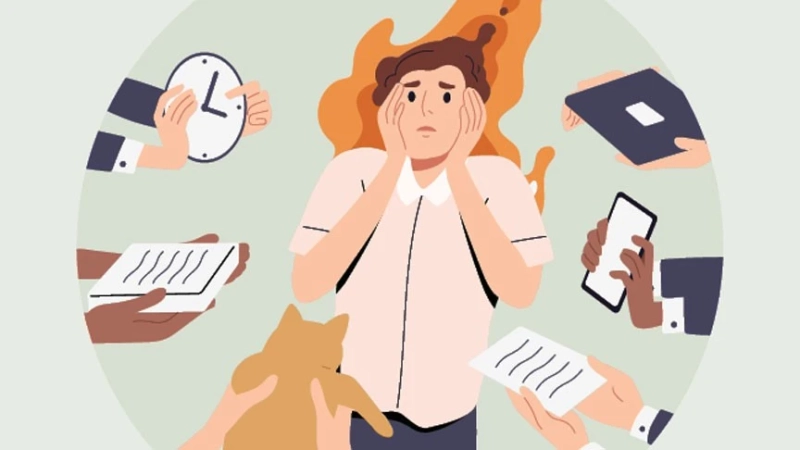In today's whirlwind of life, stress is as common as the air we breathe. Before we know it, it sneaks into our lives. Sometimes unnoticed, other times all too palpable. It influences our minds and bodies in more ways than we might realize.
Stress is basically the body's response to any challenge. But when the pressure becomes constant, it becomes a chronic burden. Stress leads us down a path that affects our overall health.
Holistic Health and Its Perspective On Stress
In the wake of holistic health, stress is an experience that touches every part of our being, not just an emotional inconvenience. This helps us see ourselves as whole beings. It implies a deep connection that our physical health has with our emotional, and spiritual state.
Physical symptoms of stress are the body's way of sending you an SOS signal. It tells you to take a break on immediate basis. Or to nurture yourself back to balance. Ignoring these signals can result in major health issues.
Thus, you better tune in and pay heed to what your body is trying to tell you.
Types Of Stress
Stress are of two main types: acute and chronic. Acute stress is the adrenaline rush with which you can avoid a car accident or meet a tight deadline. It's short-lived and often leaves in no time.
Chronic stress, on the other hand, is the unwelcome guest. It stays, slowly seeping into every corner of your life. It's the result of the nagging worries that don't let up.
Acute stress is often beneficial as it gives us the necessary energy to face instant challenges. On the contrary, chronic stress wears us down. It badly affects our health in a myriad of ways.
Holistic health implies your well-being beyond the absence of illness. It acknowledges that our mental, emotional, physical, and spiritual being are all linked. This perspective suggests by considering all aspects of our lives can we truly address stress.
Physical Symptoms of Stress
Physical symptoms of stress comprise a host of symptoms. Mentally, you begin to feel anxious or depressed. Ultimately, you cannot think clearly or make wise decisions, to say the least.
Emotionally, you might feel overwhelmed, more so, detached. While spiritually, stress makes you feel disconnected from your sense of purpose. The things that once brought joy to your life become meaningless in the blink of an eye.
Let us explore some physical symptoms of stress:
Muscular and Skeletal System
An unmistakable sign of stress is muscle tension. Ever felt like you're carrying the weight of the world on your shoulders? You can really feel it. Your shoulders feel tight like rocks are weighing them down. Your neck and back get knots that are painful to the touch. Massages help but the tension always seems to come back.
Headaches are another pressing issue. Especially migraines. It's like your brain is in a vise being squeezed from all sides. Even closing your eyes in a dark room doesn't make it better. You simply want to quit from everything.
Digestive System
Your digestive system takes a hit too. Stress doesn't sit well with your stomach. That pit in your stomach feeling like you're nervous about a big presentation. Or worse, actual nausea or diarrhea. Appetite changes too - either you're constantly snacking to soothe your nerves or nothing sounds good at all.
Cardiovascular System
Cardiovascular symptoms are no joke either. Stress puts your heart under pressure, quite literally. Your heart races like you just sprinted upstairs. Your blood pressure spikes out of nowhere. I've even felt chest pain before which is really scary.
Immune System
Under stress, your body's defense system lowers its guard. The immune system weakening is subtler but impacts your quality of life. You pick up every little bug going around. A cold hits you harder and lingers longer than others.
Respiratory System
Stress can leave you breathless, sometimes literally. Breathing can become more rapid and shallow too. Like there's not enough air in the room. It is as if you are constantly in fight-or-flight mode. Sometimes it escalates to feeling like you're gasping.
Integumentary System
Stress can also take a toll on your appearance. The skin, hair, nails also show imbalances. Acne flares up in places you haven't had it in years. Hair falls out more in the brush. Nails break or grow funny. It is as if your body advertises the internal turmoil through your skin and hair.
All of these physical symptoms of stress take a toll over time if the stress isn't managed. It's really important to find healthy ways to distress like exercise, meditation, and talking to others. Your mind-body connection is so real.
Strategies for Managing Physical Symptoms of Stress
Here are some strategies that can help manage the physical symptoms of stress:
Lifestyle Changes
In order to manage stress, you must bring positive changes to your daily lifestyle. Exercising everyday can practically do wonders. Even just going for a walk outside when feel tense is so helpful. The endorphins released during exercise naturally lift your mood.
It's also important to heed what you're filling your stomach with. Eating plenty of fresh fruits and veggies, and optimal nutrients will give you energy and make you feel so much better overall. A balanced diet is key.
Mind-Body Techniques
Practicing meditation and mindfulness is a great way to start your day. Try to quiet your mind for just 10 minutes. It will change your life in ways you have never thought of. It helps you relax into a sense of calm.
Similarly, yoga and tai chi offer a full mind-body approach to reducing tension. The physical movement coupled with deep breathing really promotes relaxation from the inside out.
Professional Support
If stress sometimes feels like too heavy a load to carry alone, don't hesitate to reach out. Speaking with a medical professional or therapist provides customized support.
Therapy techniques like CBT can offer concrete strategies for handling stressors and shifting thought patterns that contribute to feeling overwhelmed. Just talking through challenges with an objective listener helps lighten the load.
Holistic Practices
Holistic remedies can also be extremely soothing. Things like ashwagandha, valerian root and magnesium have calming properties that many people find relief with.
Massage and acupuncture are wonderful for releasing physical tension holding you back from feeling at ease. Finding what blending of techniques works best for you is key.
Conclusion
Stress impacts us in deeper ways beyond discomfort - how we think, feel and find purpose and connection with others.
By embracing holistic stress relief like meditation, exercise and nutrition, we strengthen our resilience during tough times. It allows us to thrive even when life throws curves.
Making mindfulness, movement and good self-care routines part of our daily lives gives us power over stress. This harmony within ourselves is vital for true well-being, vitality and joy.
As life gets complex, it's good to remember our wellness depends on mind, body and soul working as one strong, balanced system. Addressing physical symptoms of stress holistically opens the door to better health and an even richer life ahead.


